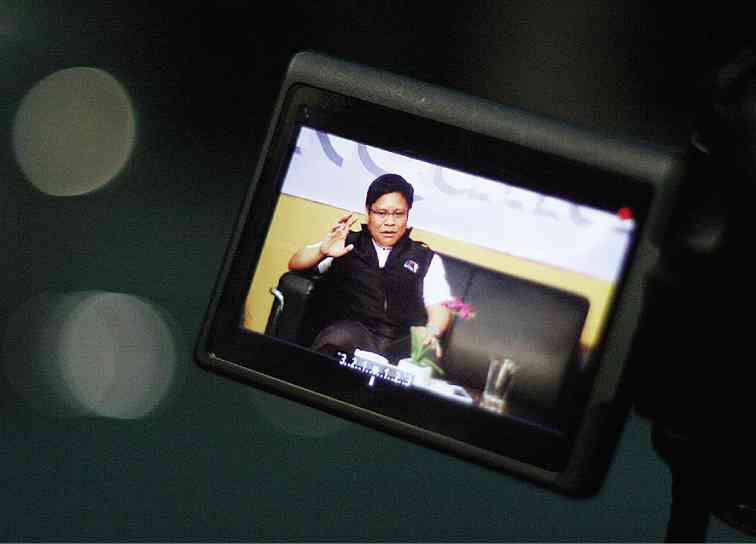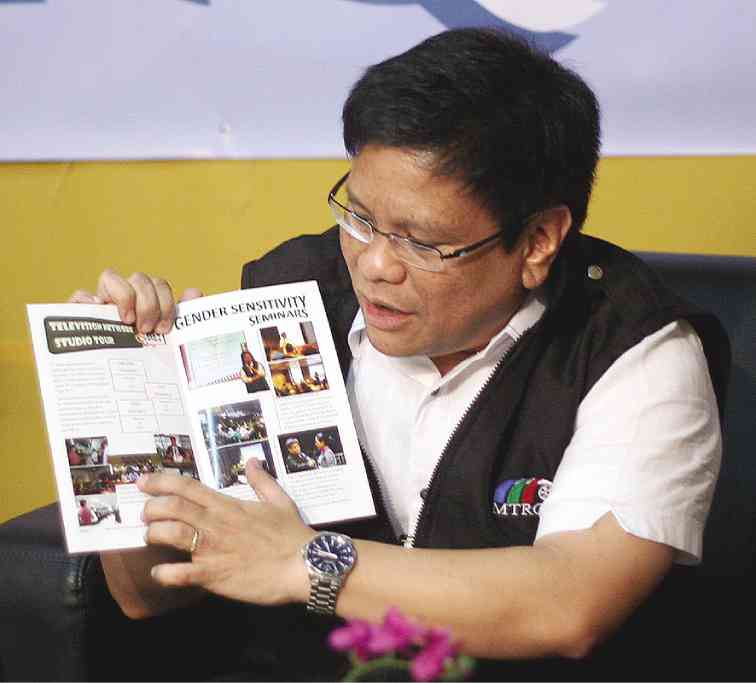Toto Villareal, MTRCB chief: I have to walk my talk
Movie and Television Review and Classification Board Chairman Eugenio “Toto” Villareal is certainly the busiest member of his 30-man team.
Since he assumed the position vacated by Grace Poe-Llamanzares, now a senator, in November 2012, Villareal has been meeting with executives of broadcast giants ABS-CBN, GMA 7 and TV5. He has guested on countless radio programs and has been featured in several newspapers. He has also been seen visiting malls, bus terminals, even ferry ports.
“There is so much that every Juan de la Cruz has to understand about what the MTRCB is trying to accomplish,” explains Villareal, also a practicing lawyer and a professor at the Ateneo College of Law. “I’m more active now than I was as a lawyer. This position is definitely a challenge. I have to walk my talk.”
As MTRCB chief, Villareal spearheads the information campaign “Matalinong Panonood Para sa Pamilya ni Juan at Juana,” whose aim is to empower Filipinos, so that they may understand how the MTRCB ratings systems work and maybe help in their implementation.
In line with this, the board is hosting a 2nd Child Summit on July 17 at Balay Kalinaw at the University of the Philippines in Diliman, Quezon City. Participants are parents and other concerned family members, including the help. There will be a workshop, Villareal said, and the output will be presented to movie and TV representatives who will be invited.
“We want to empower even the kasambahay. In this age of working moms and OFW (overseas Filipino workers) parents, the help have become authority figures,” Villareal notes. He gamely shares with the Inquirer team, in a recent two-hour chat, his experiences as a teacher, catechist, film lover and parent.
Here are excerpts:
Tell us about your work as a catechist before your appointment to the MTRCB.
The challenge for me was to make people in depressed areas understand the concept of the Holy Trinity. The most effective illustration that I found was the electric fan. I would tell the kids, “If it’s turned off, you see three blades distinct from each other. When the fan is turned on, the blades move in unity; they become one.
Have you given up that aspect of your life?
I still give classes sometimes, to professionals and young men. Occasionally, I get together with my law students and try to answer their questions on the subject. Every so often, I give talks. Before being appointed MTRCB chair, I was a consultant for the Episcopal Commission on Family and Life, as well as the Episcopal Commission on Social Communications.
Are these activities of yours as a private citizen relatable to your functions as MTRCB chair?
Yes, to a certain extent, because I believe that anything we do should be inspired by faith. I’m quite fortunate because I was trained as a Catholic.
The MTRCB has many people praying for its members. In fact, we have expanded our so-called regulatory council. Apart from the appointed deputies, we have volunteers—pastors, nuns from different denominations, and the youth.
At the time of my appointment, I was a practicing lawyer engaged in “toxic” litigation. That’s the term for extraordinarily difficult cases.
What cases would you consider not toxic?
Those cases that don’t require too much effort on your part. One of my favorite slogans at work is “To do the duty of the present moment.” You work to the extent that things are done in a perfect manner, but also allowing for human limitations.
I’ve been teaching at the Ateneo Law School for 11 years. I also got to teach at the Polytechnic University of the Philippines and had a stint at the Philippine Judicial Academy. I’ve been a consultant for some other academic quasi-legal projects.
Do you have time for other things, now that you’re head of this high-profile agency?
I’m actually more active now. I spearhead the campaign “Matalinong Panonood.” This started, under Grace (Llamanzares), with a TV commercial that urges viewers [to discern] the kind of entertainment they deserve. We added the aspect of family: “Para sa Pamilya ni Juan at Juana.” You will notice that the ratings are now color-coded, so that people who are educationally-challenged, through the colors, can distinguish which is which.
The MTRCB, as an agency, is not just regulatory but also developmental. In the law that created the board, we are supposed to help both the film and TV industries become viable. Since our primary audience is the family, we feel that we should help in its development and empowerment. We have made this known to film producers and TV networks. I’m confident that sooner or later, they will have synergy. The networks and film producers will feed on one another in terms of positive developments.
You say watching “The Lion King” was a turning point for you. Why is that?

MTRCB head Toto Villareal holds up a reading material about the agency’s Gender Sensitivity Program, which makers of some erring TV shows have been invited to attend. The board is not only regulatory, he says, but also developmental.
In “The Lion King” you have an extraordinary story—the relationship between Simba and his father—that everyone can understand. It’s a model of a film. Another movie that is also one of my favorites is “The Sound of Music.” It inspires. I also like that it invokes the help of God.
Senator Llamanzares said you did a thesis on “Iskul Bukol.”
She was referring to my professorial thesis, done seven years ago, about mock busters. There’s a film company in the United States that makes spoofs of hit movies. “Iskul Bukol 20 Years After” was really funny. Vic Sotto’s character does well after finishing college. He becomes a professor of anthropology and then goes to Cambodia. There’s a scene reminiscent of Indiana Jones, wherein Vic is being chased by the tribesmen while at the same time running away from boulders.
This became the backdrop for my thesis, which was a legal philosophy piece. Filipinos are often accused of being gaya-gaya, but what can we say about this American film outfit? The intellectual property law talks about common stock, meaning there is no more proprietary right to a theme that’s often used. When James Bond became famous via “Dr. No,” the late Dolphy made “Dr. Yes.” There’s no more proprietary right to the secret-agent theme.
How does it feel, now that you and the board have a backer in the Senate?
I’m happy that Ma’am Grace is there because I know that she will be of great use to the people.
Can you just outlaw a program?
You have to give it due process. Kung sasablay ang TV hosts, for example, it’s the KBP (Kapisanan ng mga Brodkaster ng Pilipinas) that has jurisdiction. On my watch, the MTRCB has already placed three programs under probation—on a per-episode review. These programs and their networks were required to undergo gender-sensitivity seminars.
We’ve been to 12 or 13 places since November. We need to go down to the grassroots to inform them of our numerous laws. Our next memorandum of agreement signing will be with the stakeholders in the PWD (people with disabilities) and senior citizen sectors.
Is this part of your best practices?
Yes. The MTRCB believes it’s important to be engaged. That’s why we visit as many places as we can. We also make rounds of radio stations, even bus terminals. I was at a bus terminal recently with board member Bobby Andrews. We made it known that no material should be shown in buses and ferries without the board’s approval.
What happens if there is a violation? Do you have police powers?
We deputize the police, but we also have a monitoring inspection unit.
The world is changing fast. These days, ferries, buses, restaurants and waiting areas are considered theaters as long as you use them as venues to show video materials. Materials for such
venues should not go beyond the PG (Parental Guidance) theatrical rating. Violators are summoned. After a preliminary conference, they [are asked] to pay administrative fines and attend a seminar.
What’s your reaction to the Court of Appeals’ recent ruling, upholding the MTRCB suspension of “Willing Willie?”
This is an opportunity for us to move on with the lessons learned from this whole incident. The CA said there are times when the state will have to step in, even when parents are present. The finding of the CA was that this [episode in which a 6-year-old boy was cajoled into dancing like a gay bar dancer] shouldn’t be taken lightly because even in times of want, economic benefit should not be reason for not protecting our children, given that their minds and sensibilities are still undeveloped.
Can your programs stand alone when you’re no longer chair?
That’s what I’m working on today. Ma’am Grace formed committees; we now have structures.
Do your staff members like your style? It seems to us that this is something more than just a job for you.
I hope they do. We practice what I call the “heroic minute”—to encourage them to wake up on time and get to work on time. I also encourage my board members to participate in talks.
What do your wife and kids say about your being MTRCB head?
My youngest says she’s very proud. My second, who is the most artistic, argues with me sometimes. He would ask, “Bakit mo binigyan ng ganitong rating ’yang film na ’yan?” My wife is just quiet about it.
How much do you like the movies?
I love “Sister Stella L” and the Fernando Poe Jr.-Judy Ann Santos starrer “Isusumbong Kita Sa Tatay Ko.” I like all Dolphy movies, especially “Omeng Satanasia.”
I expect a lot of changes in the movie industry in the coming months. We were told that by the end of this year, we would be 100 percent digital. Cinemas in the provinces could go out of business—that’s the sad reality. With this development, the MTRCB is working on using fiber-optic technology for sending and receiving materials that are up for review. This way, producers don’t to have to bring them physically to the MTRCB. We’ll be more efficient in guarding them against piracy because everything will be encrypted.
Email [email protected].
















